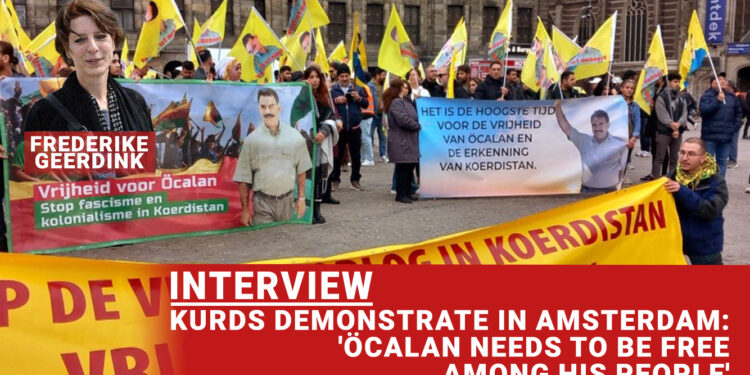Several hundred Kurds demonstrate in Amsterdam, calling for the release of Abdullah Öcalan, the imprisoned leader of the Kurdistan Workers’ Party (PKK) and a peaceful resolution of the Kurdish issue. Protesters express deep scepticism of new claims, published by Al-Monitor, that Öcalan has made contact with PKK leaders based in the mountains of Iraqi Kurdistan, effectively breaking his incommunicado detention.

Fréderike Geerdink
“Bê serok jiyan nabe!” echoes through the heart of Amsterdam – “No life without the leader!” Dozens of yellow flags with a picture of the leader in question, Abdullah Öcalan, flutter in the air. The imprisoned founder of the Kurdistan Workers’ Party (PKK) has been in total isolation for more than three years. An article in Al-Monitor claims that the isolation has recently been broken, but participants in a demonstration in Amsterdam are sceptical. “Don’t give us false hope,” they say.

Freedom for Öcalan has been the goal of the Kurdish movement for decades. They believe that if their leader walks out of prison, they as a people will be free too, and that his freedom will mean that the Kurdish issue has been solved. Demonstrations are frequently held in European cities demanding his freedom. Several hundred Kurds have attended this one, chanting slogans in Kurdish and in Dutch. There are banners reading “Stop the dirty war in Kurdistan, freedom for Öcalan” and “It’s time for freedom for Öcalan and for recognition for Kurdistan.”

Connection
Most of the Kurds marching in the demonstration had heard of the news published by Al-Monitor this week, reporting that Öcalan has been allowed to contact the PKK leadership in the Qandil (Qendîl) Mountains in Iraqi Kurdistan (Başȗr). They ask logical questions: “People in high positions in Qandil can’t use phones or other devices for safety reasons, so how could they communicate? The state is involved in such communication from jail, but how could any leaders in Qandil trust such a connection? Their precise location could become known and a drone could hit them.”
Someone else said that Kurdish journalist Amed Dicle had denied the news: “And we trust Amed Dicle. Only if our own media confirms that Öcalan’s isolation is broken will we believe it. And […] he has to have access to his lawyers and family as well.” Another said, “As long as we have no confirmation, we have no hope.”
Justice
However, something does seem to be brewing. Earlier this month, Devlet Bahçeli, leader of the ruling coalition’s far-right Nationalist Movement Party (MHP), known for his deep hatred of Kurds, especially when they assert their identity, suddenly shook hands with a number of pro-Kurdish Peoples’ Equality and Democracy (DEM) Party MPs. For ‘peace’, he said.
The Kurdish movement, whether armed or not, knows very well that peace is only peace when it is accompanied by justice and the full acknowledgement of Kurdish rights. However, this is a bridge that neither the MHP nor its coalition partner the Justice and Development Party (AKP) are likely to be willing to cross. Furthermore, the main opposition Republican People’s Party (CHP) is not known for its support for the Kurdish cause, and the same goes for a majority of Turkish citizens.
As one of the protesters in Amsterdam phrased it: “Kurds need full equality. When a Turk goes to Diyarbakır (Amed) to rent a house, they are welcomed and assisted. When a Kurd goes to Antalya to rent a house, they are discriminated against. We need our rights, but we need Turkish people to shift too. We need them to recognise us as equals.”
“Turkey is weak”
One man in the demonstration laughs out loud when he talks of the MHP leader speaking of ‘brotherhood’. “Kurds have always said that all people are brothers. Turkish politicians only say it when Turkey is not doing so well and they need Kurds,” the demonstrator said.
“[Turkey] can’t achieve its goals in the mountains against the PKK, and its ally the Kurdistan Democratic Party (KDP) is going to lose the elections in Başȗr,” he continued, concluding, “The Turkish economy is doing badly and the situation in the Middle East is getting more and more violent. Erdoğan is afraid. Turkey is weak.”
Some protesters are worried about certain Kurdish politicians in Turkey who have demonstrated enthusiasm for possible peace negotiations. One asks, “They won’t settle for anything less than we deserve, will they?” Others think this is not an issue. “We’ll talk, but we won’t surrender,” they say.
None have any trust in Erdoğan, drawing parallels with Israel and Palestine: “Look what Israel is getting away with! This will embolden Erdoğan. [He] is playing a double role, showing himself as a brother of Palestinians while sending oil and weapons to Israel. He can’t be trusted.”

Future
Another complains about the speculation. “If there is contact with Öcalan, it has to be out in the open. Both sides must put it on the table, both Kurds and the state.” And, he adds, breaking the isolation is not enough. “[What would be enough] would be for Öcalan to be free, and to be in Diyarbakır. He needs to be among his people, to talk to them and guide them.” Another remarks, “He has guided us for many years. He has written all these books, he has taught us how to struggle. But he needs to be free, we do know what to do to build a future.”








Leave A Comment